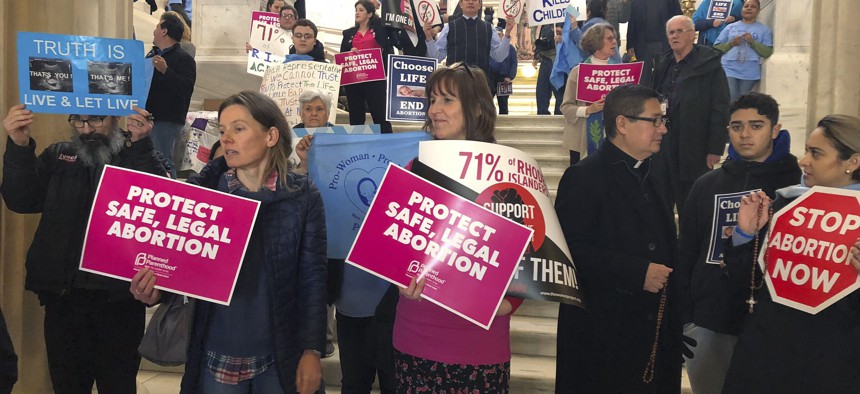Vermont Lawmakers Move to Establish ‘Fundamental Right’ to Abortion

Protesters spar over abortion rights. Jennifer McDermott/AP
STATE AND LOCAL ROUNDUP | New York expands traffic cameras in school zones … Legislation for family caregivers considered in several states … Tennessee prepares for legalized sports betting.
Vermont lawmakers passed legislation establishing a “fundamental right” to abortion and prohibiting the government from restricting access to the procedure. The measure is one prong of the legislature’s approach to ensuring reproductive rights in the state; the other initiative is to pass a constitutional amendment solidifying ‘personal reproductive liberty.’ Democrats argue that these measures merely put on paper what has already been the state practice for years, but Vermont’s Right to Life director, May Beerworth, disagrees. “They can say they’re codifying current practice if they want to all day long, but we now have the most radical, pro-abortion legislation in the country,” she said. Women’s rights groups, however, cheered the efforts of state lawmakers. The bill is now before Republican Gov. Phil Scott. Meagan Gallagher, president of Planned Parenthood of Northern New England, said that “Vermont has established itself as the shining example for all other states by acknowledging that every person is capable of—and must be trusted to—make their own health care decisions without government interference.” The constitutional amendment process is lengthy, and will culminate in a statewide referendum in 2022. If it officially enters the state constitution, Vermont will become the first state to protect abortion as a right. Many states are considering abortion legislation during 2019 sessions, although most are looking to restrict abortion, as seen in this Washington Post map. Only New York and Nevada have also passed or are considering measures to enhance protections. [WCAX; CNN; AP]
SCHOOL ZONES | New York Gov. Andrew Cuomo signed into law a measure that will install 610 traffic cameras in school zones, bringing the total in the state to 750. Cuomo cited the success of the initial 140 cameras as the reason for expanding the program, as fatalities in school zones have dropped 55% since 2014. "We know they work," Cuomo said at a press conference over the weekend. "A person who gets hit by a vehicle going 30 miles per hour is twice as likely to die as a person hit by a car going 25 miles per hour." The cameras were shut down temporarily last summer when the New York state legislature entered into a debate about alternative options including more warning lights and stop signs around schools, and hit an impasse at the end of the legislative session. New York City Mayor Bill de Blasio thanked Cuomo for renewing and expanding the program. "Speed cameras are keeping our kids safe and saving lives. We needed to protect more kids at more schools, and now we have the power to do it," de Blasio said. [AM New York; New York Daily News; WCBS]
THE ELDERLY | In North Dakota, advocates for the elderly are celebrating the passage of a bill that proponents say will make life easier for the state’s older residents. The CARE Act mandates that hospitals provide detailed instructions to familial caregivers about the medical tasks that need to be performed at home following a loved one’s release from the hospital. Similar legislation has already been enacted in over 40 states around the country, and many of the remaining states’ legislators have considered them in the past few months. Anthony Carroll, the director of the AARP in Iowa, expressed the importance of these requirements. "The majority of care isn't provided by nursing homes or assisted living or Medicaid. The majority of those long-term services are provided by family members—I mean that loosely—family and friends, unpaid caregivers who provide that overwhelming majority of long-term care." [Public News Service; The Hill]
SPORTS BETTING | Tennessee is preparing for legalized sports betting in the state. Starting July 1, people aged 21 or older will be able to place online bets through betting sites run by state-licensed operators who have to pay a $750,000 annual fee. Since Tennessee has no casinos, residents will only be able to place bets online. “I understand the appeal of walking into a casino or walking into a (sportsbook) to place a bet, but I don’t know if that is as important to younger consumers...everyone is on their phone now anyway,” said Cody Havard, an associate professor of sport commerce at the University of Memphis. But some are worried that the change will be detrimental. “Gambling is going to be much more accessible now, and one of the things we’re concerned about is that it is going to be normalized. I’ve often said the people most addicted to gambling are in our government. They’re addicted to the revenues,” said Jeffrey Derevensky, a psychology professor at McGill University. Eight other states also have legalized sports betting. [Knoxville News Sentinel; The Tennessean]
DOGS | There are multiple confirmed cases of canine brucellosis, an infectious disease that can be spread from dogs to humans, in Iowa, the state’s Department of Agriculture confirmed. Though the symptoms of the disease in humans include fever, joint pain, and nervous system issues, the chance of infection is low, said an Iowa State University statement. The outbreak has been isolated to one breeder, who has quarantined 32 dogs. The Iowa agriculture department recommended that "dog breeders, veterinary staff and anyone who comes in contact with [dogs who are giving birth] should consult their primary physician." A local animal shelter named Pet Rescue and Transport, who took in some of the dogs and is now under quarantine as well, has taken the opportunity to remind the public about the risks of getting dogs from breeders. “This is just one more reason to ADOPT and not SHOP!,” a post from the shelter said. [CNN; Des Moines Register]
Emma Coleman is the assistant editor for Route Fifty.
NEXT STORY: California Gov. Newsom Changes Course On Plan To Pay For Immigrant Health Coverage






